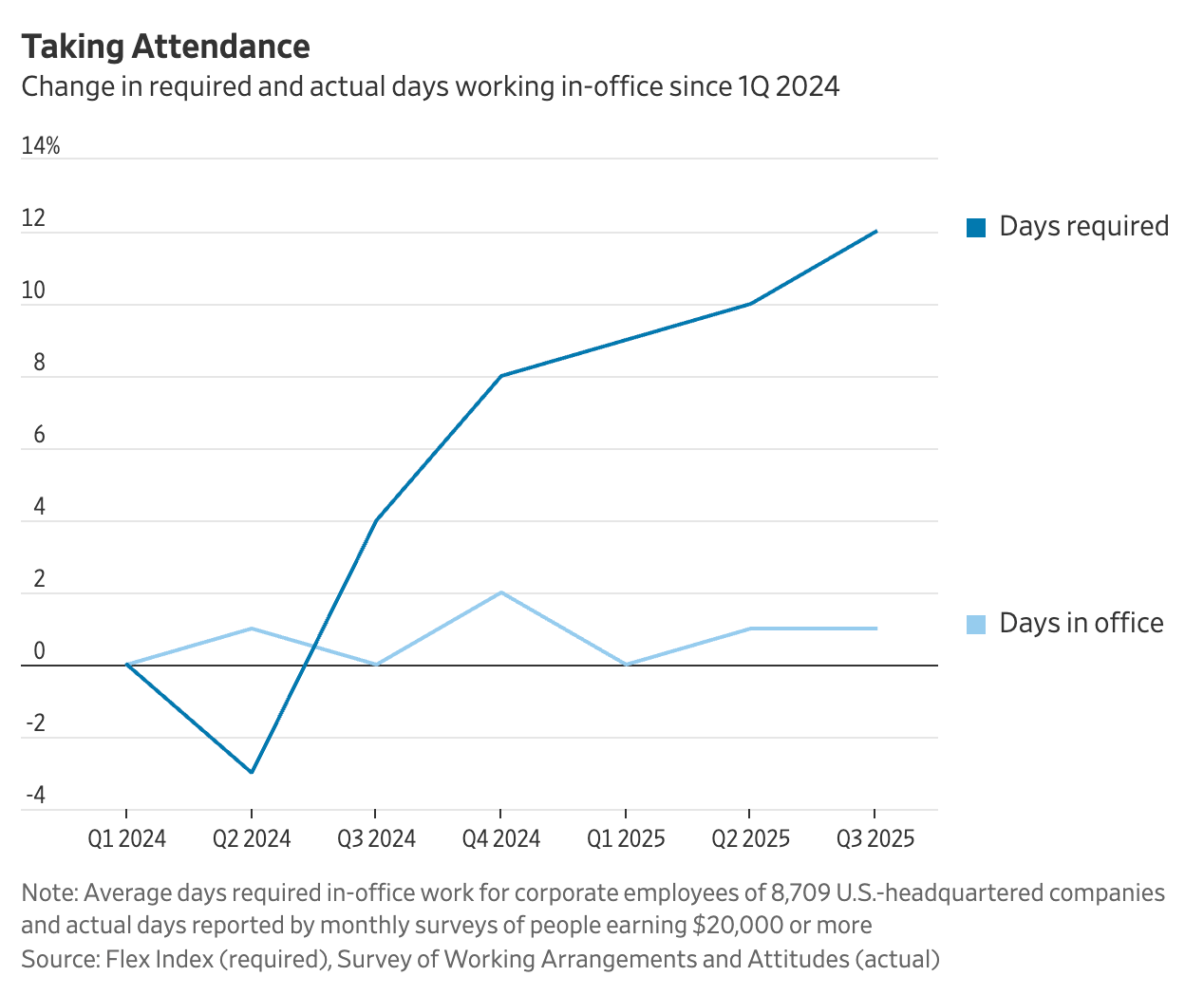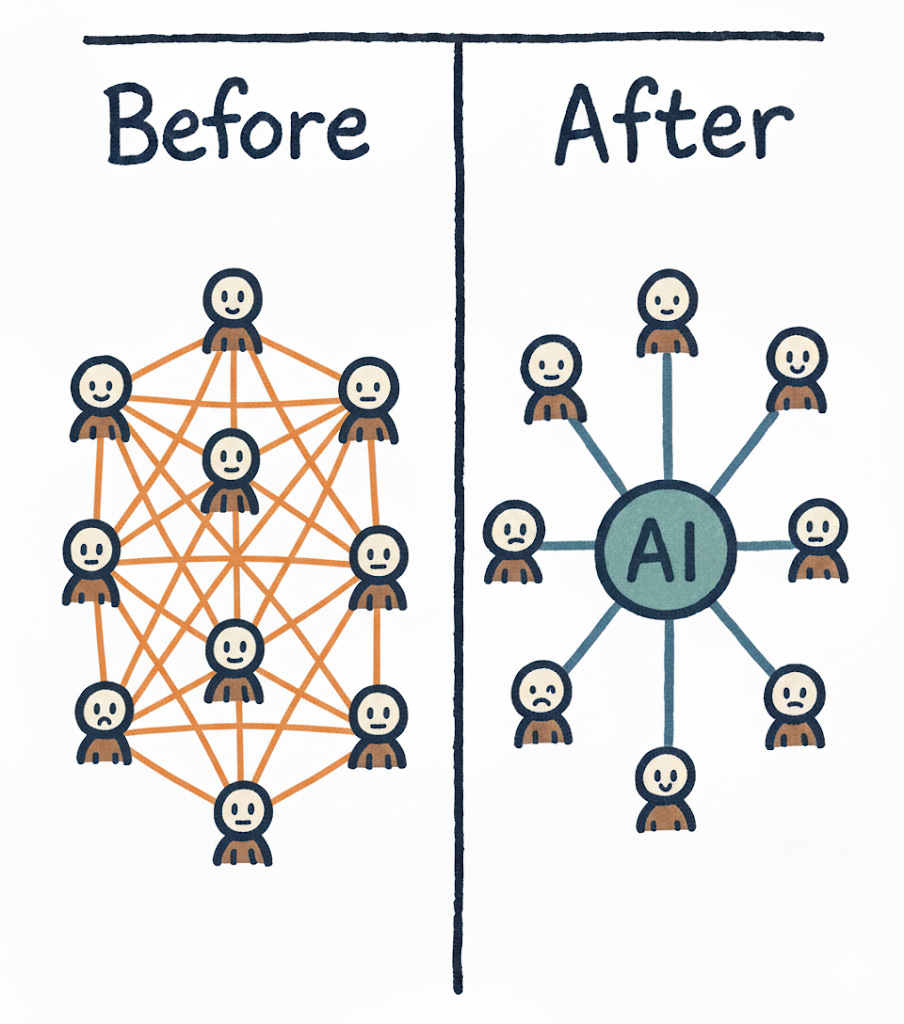This week an article within the Wall Avenue Journal shared new information in regards to the failure of Return to Workplace mandates. Over the course of the final three years we’ve heard repeated headlines of massive organisations demanding employees return to the workplace.
Bosses defined that provides of tradition had been being saved within the workplace and nobody was accessing them. The article makes use of Flex Index information to recommend that regardless of all the recent air employees simply aren’t getting in any greater than earlier than.
However the influence of that is greater, it undermines leaders on all the pieces they are saying.
When employees are requested to return into the workplace extra, they run a prediction by means of of their heads, ‘will I chat to colleagues?’, ‘will one thing worthwhile occur?’, ‘will the additional home stress justify the expense and time misplaced?’
Staff inform us in analysis that once they go in to the workplace they maintain these choices as much as scrutiny. Nothing kills RTO mandates greater than getting in to the workplace and sitting on Groups calls all day. Or not seeing colleagues due to the dearth of sizzling desks.
Abruptly we’re all positioned in an ethical conundrum: if I don’t go in on that further day will anybody say something?
Now, our boss, who doesn’t actually agree with the 4 day mandate is tasked with ‘having a phrase with us’. However they don’t hassle as a result of they don’t need to have an ungainly dialog. They inform HR they’ve had a chat with the staff.
Now we’re reached a brand new equilibrium the place staff members aren’t coming into the workplace any extra however are comfy believing that senior leaders make unhealthy choices. That’s by no means a very good place for a profitable tradition to begin.
There’s new analysis suggesting that AI chat is changing human interplay in work settings, leaving folks describing themselves as remoted and alone.
A paper styled ‘How Generative AI is Eroding Social Interactions and Pupil Studying Communities’ was revealed earlier this summer season, and it paperwork how school college students are turning to ChatGPT moderately than in search of assist from fellow school college students. The researchers famous that the arrival of the AI instruments had served to scale back social interactions with friends, lecturers and the broader group and had additionally served to depart ‘college students feeling remoted, demotivated, and shameful’. One scholar advised the researchers {that a} class group chat had gone quiet:
‘We used to [have a class Discord channel]. It was once lots of people simply asking questions on possibly, a lab or a homework… I assume everybody’s simply [using] ChatGPT now.‘
Throughout the 17 college students questioned there was a unanimous recognition that there had been a discount in peer interactions. We’re conscious that when asking fellow people for assist we have to use empathy to know their temper earlier than asking them, in distinction ChatGPT didn’t require us to observe these human abilities, ‘There’s lots you must take note of: you must learn their tone, do they seem like they’re in a rush…versus with ChatGPT, you don’t should be well mannered.’ It would make the AI superficially extra interesting, however publicity to fellow college students additionally serves to enhance our folks abilities.
11 out of 17 college students reported that the adjustments to the strategy of studying had served to make them really feel extra remoted. The conclusion of the examine offers a robust warning of what is perhaps coming for office relationships:
‘Regardless of some advantages, AI could also be inadvertently destroying the very social cloth that helps significant studying. Going ahead, it’s essential to stability the combination of AI with the irreplaceable worth of human interplay.’
Learn extra: How Generative AI is Eroding Social Interactions and Pupil Studying Communities
(HT to Pronita Mehrotra for alerting me to the analysis)
Producing this article, Make Work Higher (and the podcast, Eat Sleep Work Repeat) is a labour of affection taking me two or three full days each week. Whereas I deal with it like a full time job, it generates near zero cash (by selection). When you see worth in me persevering with this work please share it on a chat channel or with a like-minded colleague.
-
‘Moments that matter’ – I’ve been listening to this phrase lots in HR communities. The concept that we have to use our collectively time to foster significant moments of connection. The phrase got here up in a superb interview with Amy Coleman, Microsoft’s World Head of Folks Analytics. She talks about Microsoft utilizing a metric of thriving (as a substitute of engagement) to see how workers had been getting on. They describe thriving as being ‘energised and engaged to do significant work’.
One of many outputs of measuring thriving is that ‘we might see that there was an increasing number of of a correlation between folks coming into the workplace… than the parents that had been working remotely’. They regarded clearly at this and determined that this was ‘’a causal relationship’ – it was the approaching into the workplace that was making the distinction. It shaped the explanation behind the change I discussed final week of MS going from a 2.5 day RTO mandate to three days in workplace
-
On a barely extra detrimental observe this text on The Verge is a stark distinction on the state of the agency, suggesting that morale at Microsoft ‘is at an all-time low’ because the agency is riddled with ‘a tradition of concern’
-
Nick Shackleton-Jones‘ TikTok content material about ‘working in company’ is persistently humorous. (He would not put up it on LinkedIn or Reels sadly). His put up final week about CEO’s want to drive a RTO being about their standing and id is so spot on that it deserves a a lot wider viewers.
Nick says that at house center aged CEOs do not get the fawning respect they suppose they deserve from their wives and youngsters. Being revered is a crucial a part of why folks aspire to change into leaders. They like feeling like folks will take heed to them. Folks get in contact to choose their brains or ask to be mentored by them.
Alongside comes the pandemic ‘and also you’re now simply one other particular person in a t-shirt on a Zoom name’. They get criticised if they do not empty the dishwasher. Nobody retains quiet whereas they’re on their calls.
They’re determined to get again to carrying their crown within the workplace. With the collapse of the workplace their id fell aside. All the things they’d aspired to was being thrown away.
Cannot we simply return to the workplace the place folks snigger at their jokes, the place they felt necessary. The bosses need their standing again! (When you’re not on TikTok test it out on LinkedIn)
-
Throughout corporations that launched formal tradition initiatives 72% confirmed no significant enhance in worker belief, engagement or retention. This HBR article about tradition finally turns into a very good learn: ‘many leaders deal with tradition as a communication technique. They consider it lives in messaging—within the articulation of goal, the rollout of values, the tone of inside marketing campaign’. The problem is when the expertise of labor doesn’t match a modified narrative. The article is crammed with sensible options: ‘At your subsequent city corridor, ask a frontline worker to open with one uncomfortable remark about tradition, chosen upfront by their friends. Don’t clarify. Don’t defend. Simply pay attention, acknowledge, and take one seen step ahead. The purpose isn’t the query—it’s what you show by the way you reply.’
If we shifted our focus from the person to the collective how totally different would our outcomes at work be?
On the brand new podcast I am joined by Colin Fisher who explains that nice groups are a very powerful contributors to nice outcomes at work. The issue is that for a lot of of our groups they’re lower than the sum of the components. Teams get greater and greater and cease being efficient. Managers keep away from having discussions about trimming groups down – and it results in failure.
Colin’s new guide The Collective Edge breaks down the substances of forming good groups. Colin Fisher is a professor at UCL Faculty of Administration





